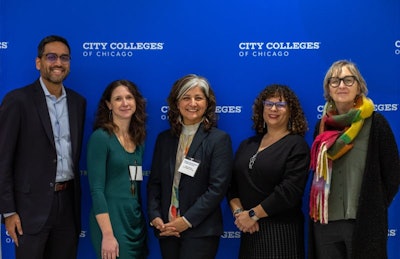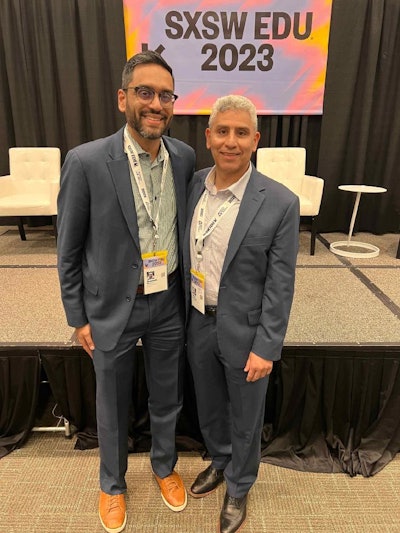The City Colleges of Chicago (CCC) have made a pledge for educational equity, and institutional and organizational partnerships will help make that pledge a reality.
The seven community colleges in the CCC system currently have a 30% completion rate for Black students and 33% completion rate for Latinx students. But CCC has committed to reaching a 55% completion rate for all by fiscal year 2032.
 Pictured from the left, OMD CEO, Aneesh Sohoni; Kelly Hallberg, Scientific Director at University of Chicago Inclusive Economy Lab; Veronica Herrero, Chief of Staff and Vice-Chancellor of Institutional Advancement at City Colleges of Chicago; Joanna Trotter Executive Director at JPMorgan Chase; Marianne Bertrand, Professor of Economics at University of Chicago Booth School of Business .
Pictured from the left, OMD CEO, Aneesh Sohoni; Kelly Hallberg, Scientific Director at University of Chicago Inclusive Economy Lab; Veronica Herrero, Chief of Staff and Vice-Chancellor of Institutional Advancement at City Colleges of Chicago; Joanna Trotter Executive Director at JPMorgan Chase; Marianne Bertrand, Professor of Economics at University of Chicago Booth School of Business .
“It is a long-term goal, but it’s still incredibly ambitious when you look at the gap that’s currently there,” said Herrero. “We had to look at that gap and say, ‘ok, these are really big gaps, but we can’t be quiet about it, or say it’s too big to close.’ We absolutely had to put it out there, to mobilize not just district but city and state partners around this goal.”
Executing the vision will take collaboration, resources and data-driven solutions. That’s one of the reasons CCC has decided to expand its partnership with One Million Degrees (OMD), an organization that supports community college students to completion, ensuring they reach the path to economic mobility.
OMD currently serves about 900 students in the CCC network. Starting at Olive-Harvey College and eventually expanding to Malcolm X College, which have the highest percentage and number of Black students in the CCC system respectively, all incoming students will automatically be supported by OMD coaches. Students will have to “opt-out” of wrap-around services instead of “opting-in,” an approach that will make all the difference, said Dr. Jhenai Chandler, director of college completion at The Institute for College Access and Success (TICAS).
“We want to make sure all students do well,” said Chandler. “Now, OMD and CCC will be able to be proactive in pushing out services and supports that they know have gotten students to completion and retained in academics.”
TICAS studies student success programs that measure their effectiveness through Randomized Control Trials (RCTs), which ensure a practice, not an individual student, is key to producing a desired result. The University of Chicago’s Inclusive Economy Lab’s RCT of OMD helped to show CCC leadership that their support truly made a difference in a student’s probability of completion. Students who applied to OMD before they enrolled in a postsecondary institution were 70% more likely to enroll in college, 94% more likely to remain enrolled, and 73% more likely to earn a degree within three years and move into the workforce or pursue a four-year degree.
 Aneesh Sohoni and City Colleges of Chicago Chancellor Juan Salgado participate in SxSW panel, How Diverse Students Access & Thrive in College. Photo credit: Jessica Douglas, OMD.
Aneesh Sohoni and City Colleges of Chicago Chancellor Juan Salgado participate in SxSW panel, How Diverse Students Access & Thrive in College. Photo credit: Jessica Douglas, OMD.
Aneesh Sohoni, CEO of OMD, said it took courage for Juan Salgado, chancellor of CCC, to open the doors to his institutions and build the partnerships and collaboration that will “ensure a broader set of opportunities for students who attend CCC.”
“What we’re doing here is really trying to show and demonstrate what is the true cost and investment necessary to really support our students to achieve career success,” said Sohoni. “We know it’s possible to invest in the true cost of supporting students. Many data suggest Chicago’s economy is not an inclusive economy as it is, and a big reason for that is not supporting the talent that attend CCC. We view this as a way to create a more just, equitable, and fair Chicago.”
If the new expanded partnership aligns with the Inclusive Economy Lab’s RCT research, the additional tuition revenue gained through retaining students will sustain the programmatic elements almost in their entirety, said Herrero. To cover additional costs, like the $1000 stipend, CCC will turn to its philanthropic foundation to start a campaign.
CCC hasn’t just expanded its partnership with OMD in its quest for universal 55% completion. They have connected with Achieving the Dream, a network of equity focused community colleges, and the College Excellence Program at The Aspen Institute, which works to improve higher education’s practices and leadership to better support students of color to success.
“We can’t achieve equity, and we can’t ensure our students are meeting their potential and experience the economic mobility they deserve after receiving a postsecondary education, without partnerships,” said Herrero. “Now that we’ve opened our doors, everyone can now see and recognize CCC as a true partner in improving the conditions of the city, making us more competitive, and making sure we’re making an inclusive workforce.”
Liann Herder can be reached at [email protected].






















